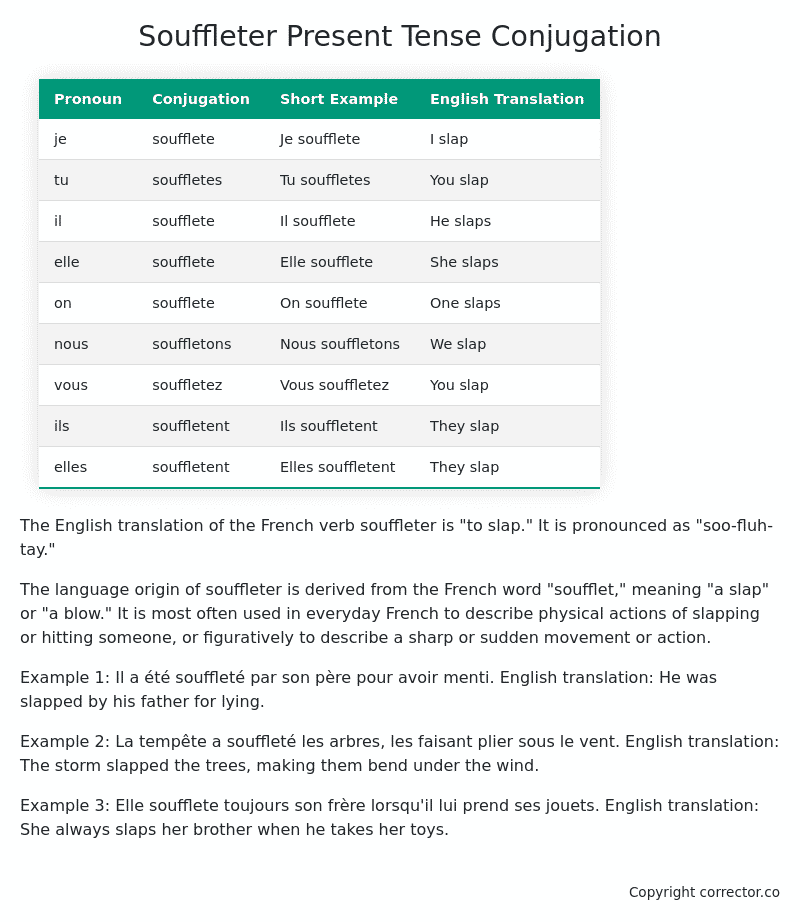Le Present (Present Tense) Conjugation of the French Verb souffleter
Introduction to the verb souffleter
The English translation of the French verb souffleter is “to slap.” It is pronounced as “soo-fluh-tay.”
The language origin of souffleter is derived from the French word “soufflet,” meaning “a slap” or “a blow.” It is most often used in everyday French to describe physical actions of slapping or hitting someone, or figuratively to describe a sharp or sudden movement or action.
Example 1: Il a été souffleté par son père pour avoir menti.
English translation: He was slapped by his father for lying.
Example 2: La tempête a souffleté les arbres, les faisant plier sous le vent.
English translation: The storm slapped the trees, making them bend under the wind.
Example 3: Elle soufflete toujours son frère lorsqu’il lui prend ses jouets.
English translation: She always slaps her brother when he takes her toys.
Souffleter – About the French Present Tense
To take a deep dive into all the French tenses then see our article on Mastering French Tense Conjugation.
Common Everyday Usage Patterns For Le Present
Interactions with Other Tenses
Table of the Present Tense Conjugation of souffleter
| Pronoun | Conjugation | Short Example | English Translation |
|---|---|---|---|
| je | soufflete | Je soufflete | I slap |
| tu | souffletes | Tu souffletes | You slap |
| il | soufflete | Il soufflete | He slaps |
| elle | soufflete | Elle soufflete | She slaps |
| on | soufflete | On soufflete | One slaps |
| nous | souffletons | Nous souffletons | We slap |
| vous | souffletez | Vous souffletez | You slap |
| ils | souffletent | Ils souffletent | They slap |
| elles | souffletent | Elles souffletent | They slap |
Other Conjugations for Souffleter.
Le Present (Present Tense) Conjugation of the French Verb souffleter (this article)
Imparfait (Imperfect) Tense Conjugation of the French Verb souffleter
Passé Simple (Simple Past) Tense Conjugation of the French Verb souffleter
Passé Composé (Present Perfect) Tense Conjugation of the French Verb souffleter
Futur Simple (Simple Future) Tense Conjugation of the French Verb souffleter
Futur Proche (Near Future) Tense Conjugation of the French Verb souffleter
Plus-que-parfait (Pluperfect) Tense Conjugation of the French Verb souffleter
Passé Antérieur (Past Anterior) Tense Conjugation of the French Verb souffleter
Futur Antérieur (Future Anterior) Tense Conjugation of the French Verb souffleter
Subjonctif Présent (Subjunctive Present) Tense Conjugation of the French Verb souffleter
Subjonctif Passé (Subjunctive Past) Tense Conjugation of the French Verb souffleter
Subjonctif Imparfait (Subjunctive Imperfect) Tense Conjugation of the French Verb souffleter
Subjonctif Plus-que-parfait (Subjunctive Pluperfect) Tense Conjugation of the French Verb souffleter
Conditionnel Présent (Conditional Present) Tense Conjugation of the French Verb souffleter
Conditionnel Passé (Conditional Past) Tense Conjugation of the French Verb souffleter
L’impératif Présent (Imperative Present) Tense Conjugation of the French Verb souffleter
L’infinitif Présent (Infinitive Present) Tense Conjugation of the French Verb souffleter
Struggling with French verbs or the language in general? Why not use our free French Grammar Checker – no registration required!
Get a FREE Download Study Sheet of this Conjugation 🔥
Simply right click the image below, click “save image” and get your free reference for the souffleter Present Tense tense conjugation!

I hope you enjoyed this article on the verb souffleter. Still in a learning mood? Check out another TOTALLY random French verb present conjugation!


